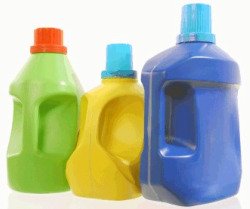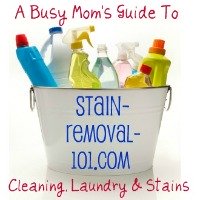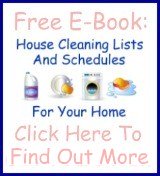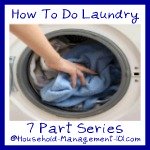
|
Typical Laundry Supplies For Your Household And How To Use Them EffectivelyDo you use the same laundry supplies as your parents did, but don't know why? I know I did when I first started doing laundry because I learned by example, but no one explained why we used what we did.  It reminds me of the old joke: A woman cuts the end off her ham and puts it on the tray to bake and her husband said, "why do you do that?" She said, "because my mother did." So, she called to ask why her mother always cut the end off the ham. Her mother said, "because my mother did it." So the mother called the grandmother to find out the secret. The grandmother said, "because my pan was too small for the whole ham." I was like that young woman, just blindly doing what the previous generation had done without any idea why. I mechanically knew the process of how to do laundry, but I didn't understand how various laundry supplies should or could be used to help me out. There is a lot of science behind how laundry supplies work, which is quite interesting for us science nerds (I use the term affectionately since I was a biology major in college), but that subject is a bit dry for regular conversation. However, once you get down the basics a bit of extra knowledge in how to wash clothes and treat laundry stains will give you that extra edge to go from merely getting by with the laundry to mastering Laundry 101. Therefore, what follows is a list of a typical household's laundry supplies (and some oldies that most people don't have in their home anymore) and what they are used for. What Are Your Must-Have Supplies?We want to hear from you! Tell us your favorite supplies for laundry here. You can also read about other readers' must-have supplies for their laundry here. Detergents:There are many types of detergents out there, and a basic knowledge of them is useful when you are going through the store determining which laundry supplies to buy for your family's needs. "Free" - means without perfumes, fragrances, or dyes. I recommend using these types of detergents for babies and anyone with allergies or sensitive skin. Liquid - best to use if you are going to wash in cold and/or hard water because it is already dissolved in a liquid and therefore will not clump. Powder detergent can be harder to use in cold or hard water because of problems with it dissolving fully into the wash water. Powder - better for getting out clay and dirt than liquid detergent, and generally cheaper because you are not paying for water too, just detergent. Although beware, because sometimes there are lots of fillers in powder detergent which can also be a waste of money for the volume purchased. High efficiency - for front-loading washing machines, which use significantly less water than top loaders, and therefore require significantly less detergent. Mild - typically used for delicates in cold water washings, and typically found in liquid form. Some can and some cannot be used in the washing machine so read the label carefully. Bonus Tip Regarding DetergentDo not use more than the recommended amount of laundry detergent, because the residue just stays in the clothes and wastes your money. Plus, the recommended amount of detergent is a lot less than you think it is. The exception to this is when you have an exceptionally dirty load of laundry, including using a laundry stain removal technique which calls for excessive amounts of detergent, in which case you need to then rinse the clothes additional times to get all that extra detergent out at the end. Whiteners And Brighteners:Each of these laundry supplies is used, generally along with the detergent, to increase the detergent's effectiveness or otherwise better clean the clothes. Baking soda - it is a gentle detergent booster, and some claim it also helps rinse the clothes better of extra detergent, thereby acting as a natural fabric softener. It also increases the alkalinity of the wash water, meaning it neutralizes acids such as vomit and urine which can get on clothes. Borax - a detergent booster that makes a detergent less mild. It is generally used in diaper soaks because it cleans and whitens, while also increasing the absorbency of the cloth. Chlorine bleach - this is a must have laundry supply for your laundry room, but you need to know how to use it effectively or you can be in for some laundry disasters. Chlorine Bleach PrimerBasic information about chlorine bleach:
Directions for use of chlorine bleach:
If you really want to give the enzymes maximum time to do their work, especially if you have laundry stains, you will want to presoak even longer - see below for more details. Warnings about chlorine bleach:
Bonus tip regarding chlorine bleach:Because it is a disinfectant chlorine bleach is great to use to wash underwear, potty accidents, clothing that has had a diaper leak, or dish towels that have touched raw meat or other unpleasantries. Bonus bonus tip regarding chlorine bleach:Even if the clothes or linens you need to wash cannot be chlorine bleached, you can still run a quick empty load in your washing machine after you wash the yucky stuff, add chlorine bleach and not have to worry that bacteria or other germs will be transferred to another load of laundry in the future because it disinfects your washing machine. Bonus bonus bonus tip regarding chlorine bleach:You can also run the washing machine with chlorine bleach in it to help rid it of mildew that grew if you ever forgot to take the washing out and it sat for a while. Oxygen bleach (also known as color-safe bleach or non-chlorine bleach) - this is another must have for your laundry supplies, especially if you have small children, because it gets lots of stains out without a lot of effort, and is generally safer on more types of clothes than chlorine bleach. Color Bleach Primer
Enzyme presoaks - By and large these are safe for all washable fabrics. Because of this they are found in many detergents and color-safe bleaches so you probably have these in your laundry supplies and may not have realized it. You typically don't find them by themselves in the laundry supplies aisle of the store. Enzyme Presoaks Primers
Washing soda - This is not typically found in a household laundry supplies anymore. It can be added as a detergent builder for greasy stains, or used as a presoak. It works by increasing the alkalinity of the water. White vinegar - This can be a great addition to your laundry supplies, and it is cheap which is great too! Laundry Tips With Vinegar
Fabric Softeners:This is the most controversial of the laundry supplies, with a debate raging between two sides about whether fabric softener is even necessary or beneficial. Here is the basics of both sides so you can make your own decision about whether to include fabric softeners within your laundry supplies. Types of fabric softeners:Detergents that contain them - I highly recommend you do not buy detergents with fabric softeners in them. The reasons include that it is generally more expensive to buy them combined in one bottle than separately, and in addition, the detergent does not clean as well with the fabric softener present. Fabric softener is not meant to be added while the clothes are actually washing, just during the rinse. Liquid - can cause oily stains if use too much, which you have to launder again to get out. It seems, from my own observations, that liquid fabric softeners make the clothes softer than dryer sheets. Dryer sheets - can build up a residue on the lint screen of your dryer. I have found that you do not need to use a whole dryer sheet at once for your laundry load, and can cut it in half and/or use the same dryer sheet more than once. Pros of fabric softeners:Reduction of static cling - Because I dry clothes in the dryer I have found I need, especially in the winter time, to use some type of fabric softener to reduce static cling. I have chosen to use dryer sheets because I cannot find any liquid fabric softeners which do not have a strong scent, and my husband hates the smell of vinegar so I can't use it as a natural fabric softener. It makes fabrics feel soft, of course! Cons of fabric softeners:Fabric softeners can easily build up a residue on your clothes. To lessen this effect try to use them only every couple of loads, and if using dryer sheets use less than a full dryer sheet with each load in the dryer. Many claim that fabric softeners lessen absorbency, and therefore they should not be used with towels, diapers, or other items that are supposed to be absorbent. I have not found this to be a big problem however, as long as I adequately rinse the detergent from my towels, for example, because the extra detergent seems to lessen absorbency more than the addition of the fabric softeners. Fabric softeners often have a warning on them that they lessen the effectiveness of the flame retardant used on clothing, such as children's pajamas. Natural fabric softenerRemember that the natural fabric softeners, white vinegar and baking soda, were discussed above. Because of all the cons to synthetic fabric softeners many people have turned to these natural products to soften their laundry. I cannot guarantee these natural products would reduce static cling though. ConclusionThat about sums up all the most important information about laundry supplies, and how and when to use them. I will leave ironing supplies for another day. In addition, see my post on laundry stain removal tips for a list of supplies for your laundry stain removal basket. I hope this helps you ace Laundry 101! What Is Your Family's Favorite Laundry Supply And Why?Do you and your family have one must have, never can run out of it laundry supply? Share your tips and ideas with everyone so we can see if it is right for our family too! Read About Other Visitors Favorite Laundry SuppliesClick on the links below to see the favorite laundry supplies of other visitors to this page...
Soap Nuts For Wash, Vinegar For The Rinse - Favorite Laundry Supplies
Vinegar - My Favorite Laundry Supply
Tide Laundry Detergent - Does It Work Or Not?
Laundry Hints To Get Out Odor And Grime - Oxyclean And Borax Related Pages You May EnjoyMake A Weekly Schedule For Laundry Go From Household Laundry Supplies to Home Page |
Let's Stay Connected!Get Free Email Updates Visit My Other WebsitesStain-Removal-101.com
Home-Storage-Solutions-101.com
|
||

Need A Free Laundry Refresher Course?
|
|||
|
Return To Top | Home Page | Blog | Newsletter | Contact Me | About Me | Sitemap | Privacy Policy | Disclaimer | Disclosure | |||
|
Copyright © 2008 - 2026 - Flanery Companies, LLC - All Rights Reserved
| |||
Share Your Comments, Thoughts & Ideas